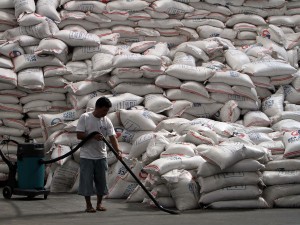Thailand offers lower price for rice after bid
MANILA, Philippines—After losing to Vietnam in the Philippine government’s auction to supply 500,000 metric tons of rice last November, Thailand is still bent on bagging the supply contract, submitting a counter-offer that was lower than Hanoi’s winning bid of $462.25 per MT, according to National Food Authority (NFA) documents.
The NFA, however, ignored Thailand’s lower offer of $462 per MT, which was 25 cents lower than Vietnam’s, saying it would violate provisions of Republic Act No. 9184, the government’s procurement law.
The NFA said Thailand should have submitted its best offer during the bidding.
In a Dec. 5 legal opinion, Government Corporate Counsel Raoul Creencia said: “All told, the NFA is not obliged to accept the Royal Thai government’s re-offer in the bidding.”
“The Philippine government may, however, in a separate transaction avail itself of the (June 2011) memorandum of agreement (MOA) to negotiate with the Royal Thai government for a separate procurement of rice,” he added.
The Thai Department of Foreign Trade offered the lower price on Nov. 26, the same day the NFA and Hanoi’s state-owned Vietnam Southern Food Corp. signed the contract for the supply of the cereal to serve as the country’s “buffer stock” for the period December 2013 to March 2014.
Thailand’s original bid was $475 per MT, $12.75 higher than Vietnam’s.
In asserting its position, the Thai Department of Foreign Trade invoked the June 2011 MOA between Bangkok and Manila.
In a letter to NFA Administrator Orlan Calayag, Thai Foreign Trade Director General Surasak Riangkrul said that during negotiations, “the price offered by the Royal Thai government shall be reviewed and evaluated by the Philippine government.” Riangkrul’s letter, dated Nov. 26, was received the following day by the NFA.
“Should the price be acceptable to the Philippine government, it shall accept the offer and proceed with the procurement of the commodity. (But) if the price is not acceptable, the parties shall immediately proceed to negotiate an acceptable price until an agreement is reached,” Surasak said, quoting the MOA.
But Creencia explained that “the MOA between the Thai and Philippine governments contemplates a bilateral agreement between the two countries.”
“On the other hand, for the November bidding, the Thai government was fully aware that the invitation was for it to submit a sealed bid offer for the procurement of the country’s rice requirements, which was not the procurement through negotiation contemplated in the MOA,” he said.
NFA sources, however, dismissed the NFA’s and Creencia’s positions as “flawed.”
“The NFA limited the participants to only two countries, both of which had earlier entered into MOAs with the Philippines. Clearly, the action of the NFA was disadvantageous to the Philippine government,” said an NFA official, who sought anonymity for lack of authority to speak to media.
Said another source: “Since the MOA (with Thailand) allowed it to make a new bid, then the NFA was mandated to at the very least make Vietnam match the offer of Thailand, or in the spirit of cordial relations between Asean member states, arrange a sharing of the rice supply under mutually acceptable terms.”
“Even assuming that RA 9184 was their basis, then they have violated the same law. Because under RA 9184, the NFA should have published invitations for an international tender, which would allow not just Vietnam or Thailand but also other rice-producing countries, as well as private trading groups, to take part in the bidding,” the same source said.

